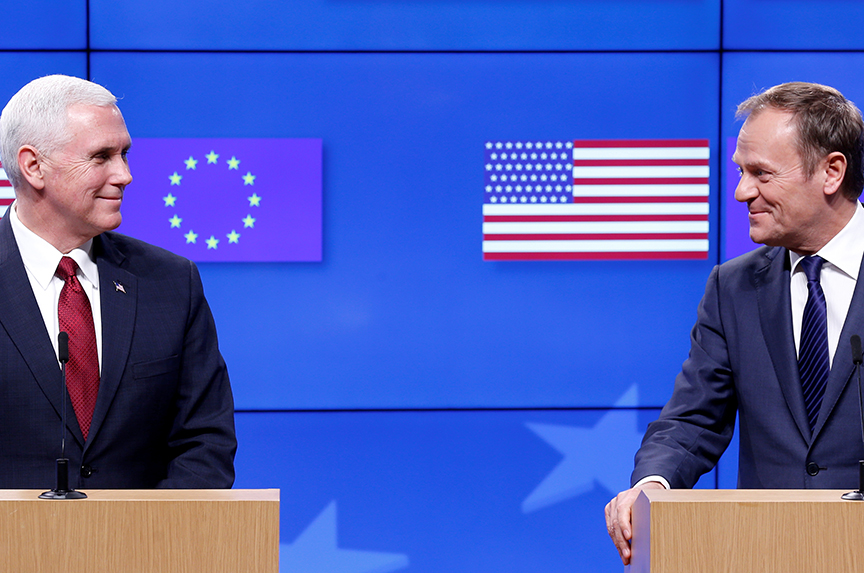 US President Donald Trump has long held disparaging views of the European Union (EU), asserting it is a failure and praising the United Kingdom for its vote to the leave the bloc. However, a weak and fragmented EU, let alone a collapsed one, and the renationalization of European politics that would follow, would be dangerous for global stability and counterproductive for both sides of the Atlantic.
US President Donald Trump has long held disparaging views of the European Union (EU), asserting it is a failure and praising the United Kingdom for its vote to the leave the bloc. However, a weak and fragmented EU, let alone a collapsed one, and the renationalization of European politics that would follow, would be dangerous for global stability and counterproductive for both sides of the Atlantic.
Trump and some of his advisers, such as Chief Strategist Stephen Bannon, reportedly favor a collapse of the EU, which they think would be in the best interest of the United States. Their preference for dealing with countries on a bilateral, rather than multilateral, basis reflects the president’s America-first approach to foreign policy.
It is more likely that the EU will collapse from its own problems than from any US effort to weaken it. For example, a victory by Marine Le Pen, the far-right populist National Front candidate in France’s presidential election this spring, could set off a chain of events that would lead to a French exit from the EU, which would doom the bloc. Le Pen, like Trump, is outspoken in her disapproval of the EU.
On the other hand, Trump is deeply unpopular in Europe where his policies and views have generated widespread backlash. For example, a recent German ARD Media poll found that a mere 22 percent of Germans consider the United States to be a trustworthy ally. That unpopularity has already helped to push back support for populism in Europe, as reflected in the outcome of the recent Dutch election and the rise of centrist leaders in France and Germany.
On NATO, Trump’s views appear to have evolved since he rattled members by calling the military Alliance “obsolete.” Yet the administration and its representatives continue to send conflicting signals. For example, US Vice President Mike Pence sought to reassure US allies at the Munich Security Conference in February, while at a meeting of NATO defense ministers that same week, US Secretary of Defense James Mattis suggested a possible reduction of the US military commitment to Europe in the absence of a greater European contribution.
While a greater European military role is to be welcomed, the Trump administration’s single-minded focus on European defense spending has led to concerns in Europe about the US commitment to the Alliance.
Since 2014, many NATO allies have increased their defense spending in keeping with their commitment at the September 2014 NATO summit in Wales. At the summit, they agreed to allocate 2 percent of gross domestic product (GDP) to defense spending, in keeping with the terms of the Alliance, by 2024. However, a focus on spending as a percentage of GDP can be misleading since it does not reflect the actual military capabilities countries can offer.
In addition, Germany is boosting its defense spending, but meeting the 2 percent target means it would become Europe’s leading military power, a dynamic that other Europeans and many Germans may find unsettling given Germany’s past.
An essential partner
The United States cannot grapple with the world’s biggest problems without Europe’s help. No one country, however powerful, can handle the enormous complexity of today’s global challenges. A strong Europe is very much in the United States’ interest because it can help ease some of the global burdens shouldered by the United States.
In addition, since Trump is focused on economics and trade, it is important to remember that Europe is by far the United States’ largest trading partner. European foreign direct investment in the United States translates into millions of US jobs and trillions of dollars of assets invested in the US market.
Trump has an opportunity to work with German Chancellor Angela Merkel and other European leaders to help put transatlantic relations on a better footing by unequivocally supporting NATO when he attends the NATO meeting in Brussels on May 25.
Europe also needs to do its part by following through with plans for a greater defense contribution to NATO and continuing to be an essential and useful partner for the United States.
A failure to take these steps risks a serious breach in transatlantic relations should Europe evolve in ways that the United States would find problematic, such as developing a truly independent military force outside NATO. Trump’s disruption of transatlantic relations has, in fact, already helped spur discussions about an independent EU nuclear deterrent.
Louis Golino, an independent writer, is retired from the Library of Congress’ Congressional Research Service where he worked on NATO and EU issues, including advising the US Senate on NATO enlargement during the 1990s.
Image: US Vice President Mike Pence and European Council President Donald Tusk held a joint news conference in Brussels, Belgium, on February 20. (Reuters/Francois Lenoir)
